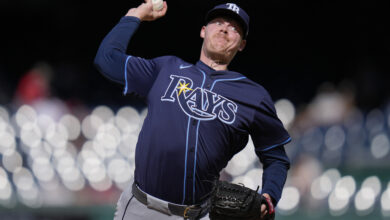
Cubs’ Front-Office Hierarchy Maybe Not as ‘Flat’ as They Make it Seem
To hear them talk about it, the Cubs front office represents the kind of baseball utopia you’d expect to find in an Aldous Huxley novel. Their shiny new hive overlooking Gallagher Way houses a collective of baseball intelligence in which interns and execs buzz around in kind, sharing their knowledge and impacting the direction of the team. It’s a “flat hierarchy,” as Jed Hoyer put it back in March.
“I’m sure we have some intern working for us that I’ll probably work for someday,” Hoyer said. “I think that’s the way it should be. You should always hire people that can take your job and this game is ever-evolving and I think it’s important to remember that.
“Our job is to bring in the best of the best of the next generation and someday those people will be running teams, and the Cubs, and there’s no point in fighting that. I think you have to embrace that.”
But recent developments in the team’s baseball operations staff give reason to question to what extent that is really the case. There’s no doubt it’s an incredible opportunity for those at the base of the pyramid who perhaps feel closer to the top than they would on the ground floor of a Sears Tower of an organization. For those with flashier titles, however, the reality could be more stark.
In talking to Evan Grant of the Dallas Morning News about his seemingly lateral move — his assistant GM title didn’t change — from the Cubs to the Rangers, former assistant GM Shiraz Rehman shed some light on his rationale.
“I try not to be too concerned with titles,” Rehman said. “My goal is to work with good people, to grow and to be able to make an impact. Those things are all crystal clear here.”
The way he said things are crystal clear in Texas seems to indicate that he didn’t feel they were quite as transparent in Chicago. Look at how Rehman characterized the structure of his old workplace (emphasis mine).
“I had seven wonderful seasons in Chicago and have [a World Series] ring that I’m very proud of, but I think I was ready for a new challenge,” Rehman admitted. “In some respects, [Chicago] was a bit of a top-heavy shop. With the Rangers, there is an opportunity to have the scope be a little larger.”
Now, it’s entirely possible that Rehman is simply voicing his frustration, albeit in a very respectful manner, with how things had been going at 1101 W. Waveland. No matter how idyllic an environment the Cubs provide for baseball minds, there’s going to be friction. We’ve seen that to a very significant extent with Joe Maddon this season.
Hoyer and Theo Epstein have both talked about how open, honest conversation between people espousing different points of view is part of any healthy relationship, and they’re absolutely right. But the face being shown to the public isn’t necessarily the same one being worn when the cameras are turned off. Now consider that all of Rehman’s interactions with his peers/bosses would have taken place away from recording devices.
I had speculated that a desire to get a fresh start in a different environment might have been at the heart of Rehman’s decision when Cubs Insider broke the news of his departure back on October 15. Given the unchanged title and a Rangers front office that also featured a young GM and several assistant GMs, it seemed a fairly obvious likelihood.
As for any impact this move will have on the product the Cubs put on the field, we’ll just have to wait and see. It isn’t likely to be something that would be felt immediately, though Rehman played an integral role in establishing and maintaining some of the technology the team used to evaluate players. Of course, he wasn’t the only member of the front office with the recipe for the secret sauce.
When you get down to it, the Cubs are no different from any other organization with a power structure comprised of talented young execs. At some point, there’s simply nowhere for emerging leaders to go, an issue that might even be magnified by the flatness of their hierarchy. Perhaps the front office is really best described as an upside-down funnel. It’s not difficult to reach the top of the dome, but fitting through that narrow tube is exceedingly difficult at this point.
Again, this is not an indictment of the Cubs’ leadership or a sign that anything is wrong with the organization. In fact, it’s really remarkable that they’ve been able to keep so many bright minds together for as long as they have. It was inevitable that the band would break up at some point. With Epstein and Hoyer still under contract for three more seasons, it’s likely we’ll see other defections as well.
The flat hierarchy, then, serves to fill those roles below the top rather than to truly groom a replacement for either big decision-maker. For now, anyway. The story may be different after the 2021 season.

